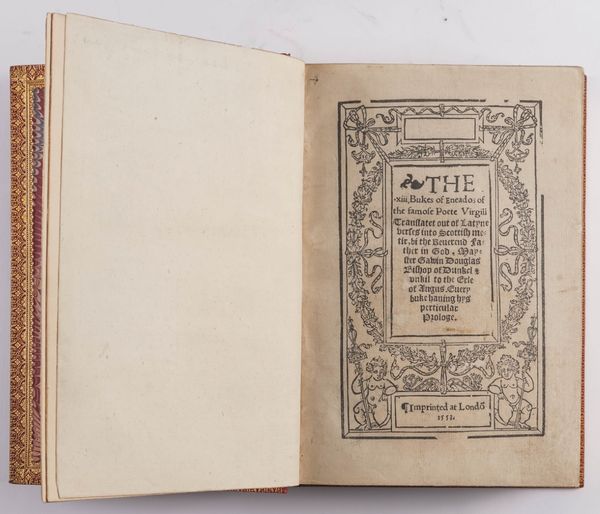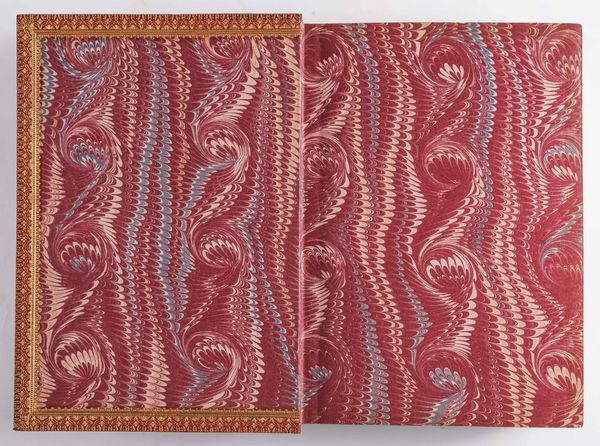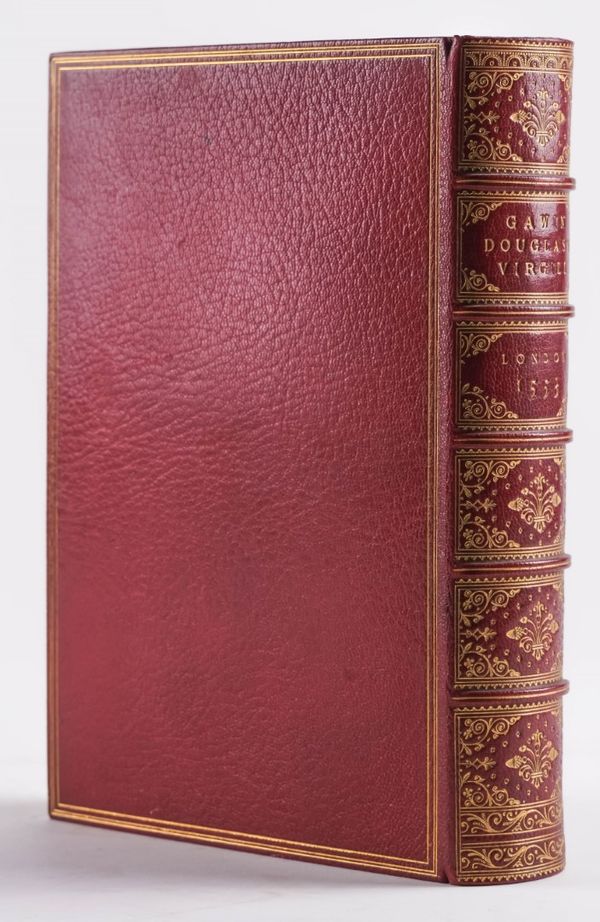DOUGLAS, Gawin (1474-1522). The xiii. Bukes of Eneados of the famose Poete Virgili Translated ... into Scottish metir, London, 1553, 4to, FINELY BOUND in later morocco. FIRST EDITION of the first translation of a poem from antiquity into English. RARE.
| Estimate: | £3,000 - £5,000 |
| Hammer price: | £24,000 |
DOUGLAS, Gawin or Gavin (c.1474-1522, translator) and VIRGIL (70 BC - 19 BC). The xiii. Bukes of Eneados of the famose Poete Virgili Translated out of Latyne verses into Scottish metir, bi [sic] the Reverend Father in God, Mayster Gawin Douglas, Bishop of Dunkel and unkil to the Erle of Angus. Every buke having hys perticular Prologe. London: [no publisher, but William Copland, with his device on the title], 1553. 4to in 8s (214 x 150mm). Title within wide woodcut decorative border, black letter, woodcut historiated and foliate initials, with the additional inserted leaf in quire x, and with final [bbvii] leaf headed "Ane exclamacion aganis detractouris ..." (sometimes lacking), with front and rear blanks [?but blanks later old-style paper] (a few very minor repairs to title with shaving to 2 letters, some light staining to title, some inconspicuous worming, rust holes, and a few pin-prick holes to text, a few inconspicuous minor repairs, sometimes with very minor loss, ink smudge or printing flaw, not compromising legibility, on verso of Cccxii [see illustration], possibly, but not obviously, washed at some point). FINELY BOUND in 19th-century scarlet crushed morocco gilt by Riviere and Son, spine gilt in compartments with 5 raised bands, gilt edges, dentelles, marbled endpapers (small scratch and very small ink spot to lower cover, some tiny white ink spots to upper cover). Provenance: The Property of a Lady, by descent from her great grandfather; "Fine paper, very rare" (very faint pencil inscription to front blank). FIRST EDITION of the first translation of a major poem from antiquity into any form of English. "In his translation of Virgil, Douglas is on quite untrodden ground. He has the merit of being the first classical translator in the language, and he seems to have set his own example by working at passages of Ovid, of which no specimens exist. He must have done the whole work, prologues and all, together with a translation of the supplementary book ["The xiii Booke"] by Maphæus Vegius, within the short space of eighteen months. He writes in heroic couplets, and his movement is confident, steadfast and regular. In several of the prologues he reaches his highest level as a poet. He shows a strong and true love for external nature, at a time when such a devotion was not specially fashionable; he displays an easy candour in reference to the opinions of those likely to criticise him; he proves that he can at will (as in the prologue to book viii.) change his style for the sake of effect; and in accordance with his theme he can be impassioned, reflective, or devout. The hymn to the Creator prefixed to the tenth book, and the prologue to the book of Maphæus Vegius - descriptive of summer and the 'joyous moneth tyme of June' - are specially remarkable for loftiness of aim and sustained excellence of elaboration" (DNB). "[Douglas] was best known for his translation of the Aeneid (Eneados, with prologues), the earliest translation of classics into English, or rather, as he commented (Prologue I, II. 117-18), into 'Scottis'. He was one of the first to draw the distinction between Scots and 'Inglis', and unlike many of his contemporaries, he wrote only in the vernacular ... [Ezra] Pound, among others, admired him, saying that 'he gets more out of Virgil than any other translator', and there is evidence that his version was used by [Henry Howard] Surrey and T. Sackville" (The Oxford Companion to English Literature (ed. Drabble, 1985)). Not in Brunet; Church Cat. I, 469; Grolier Langland to Wither 61: "This is the first metrical translation of Virgil's "Æneid" ... The only clew [sic] to the printer is the device on the title-page, which is one used by William Copland"; Pforzheimer 1027: "This is the earliest translation of Virgil's Aeneid into English (really Scots), for Caxton's translation ... has little to do with Virgil. Douglas has included the 'Thirteenth Book' of Maphaeus Vegius"; STC (citing 2nd ed.) 24797. RARE.











